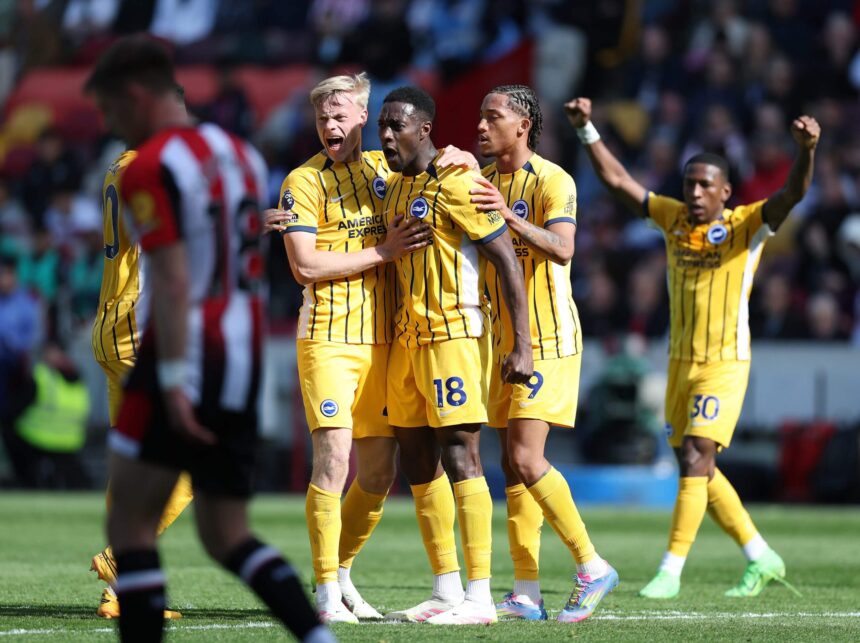The Premier League’s finishing line is in sight and some of the season’s biggest questions are already being answered. Liverpool will soon be England’s champions for a 20th time, while Ipswich Town know they are about to join Southampton and Leicester City in timidly exiting the division.
All the drama can be found in the race for the Champions League, but there are financial subplots to be found in the remaining handful of games.
Advertisement
Merit payments are the Premier League’s long-standing means of rewarding a season’s work. The higher you finish, the more money you bank. And that ensures there is much at stake between now and May 25. Manchester United and Tottenham Hotspur, for example, can yet orchestrate a theoretical swing of close to £12million ($16m), a significant sum for those requiring summer rebuilds on finite resources.
The Athletic looks at the numbers in play with five games of the season remaining.
What is each position in the Premier League worth?
The short answer is going to be somewhere in the region of £3m. The Premier League prides itself on being a meritocracy and the final sums paid out at the end of every season are shaped, in part, by the successes of each team.
There are the flat equal payments and commercial cut just for being a Premier League shareholder (last season coming to £95m), and then the two variables; facility fees and merit payments.
Facility fees reflect the number of games each club had televised domestically, with roughly £900,000 paid for each match broadcast.
Merit payments, meanwhile, are ordered from one down to 20 in the table and come from the domestic and international broadcast revenue pot. The bottom club effectively gets one share, with each club getting one more with each place.
The rising value of the Premier League’s broadcast deals, particularly in overseas markets such as the United States, has ensured the value of merit payments continues to climb and last season saw Manchester City rake in an additional £56.4m on top of their central distributions and facility fees, taking the final pay out to £175.9m.
Premier League revenue 2023-24
|
Pos
|
Team
|
Live UK TV matches
|
Merit payment (UK £m)
|
Merit payment (Intl £m)
|
Total payment (£m)
|
|---|---|---|---|---|---|
|
1 |
28 |
33.8 |
22.6 |
175.9 |
|
|
2 |
31 |
32.1 |
21.4 |
175.5 |
|
|
3 |
29 |
30.4 |
20.3 |
171 |
|
|
4 |
22 |
28.7 |
19.2 |
162.4 |
|
|
5 |
28 |
27 |
18.1 |
164.6 |
|
|
6 |
25 |
25.3 |
16.9 |
159.2 |
|
|
7 |
23 |
23.6 |
15.8 |
154.7 |
|
|
8 |
28 |
22 |
14.7 |
156.2 |
|
|
9 |
21 |
20.3 |
13.5 |
147.4 |
|
|
10 |
15 |
18.6 |
12.4 |
139.6 |
|
|
11 |
15 |
16.9 |
11.3 |
136.8 |
|
|
12 |
12 |
15.2 |
10.2 |
131.5 |
|
|
13 |
12 |
13.5 |
9 |
128.6 |
|
|
14 |
17 |
11.8 |
7.9 |
130 |
|
|
15 |
23 |
10.1 |
6.8 |
132.2 |
|
|
16 |
17 |
8.4 |
5.6 |
124.3 |
|
|
17 |
19 |
6.8 |
4.5 |
123.3 |
|
|
18 |
13 |
5.1 |
3.4 |
115.4 |
|
|
19 |
10 |
3.4 |
2.3 |
110.1 |
|
|
20 |
13 |
1.7 |
1.1 |
109.7 |
This season’s numbers are unlikely to be markedly different given we are still working with the same domestic TV deal, so the 2023-24 figure of £2.82m a place will be similar this year.
The money is not to be scoffed at. The FA Cup offers romance, but for context, the most this season’s final four of Crystal Palace, Aston Villa, Nottingham Forest and Manchester City can add to the prize money they have already won in the competition is a further £2.5m.
Who has the most to win and lose in the closing weeks?
Perhaps only Liverpool and Southampton — at opposite ends of the Premier League table — can be confident of their final position this season. Others have a fair idea and for those in the top half, there is more to be gained from qualifying for European competitions. Securing a place in next season’s Champions League, for example, will bring in anything from £40m upwards from UEFA, plus the further enhancements to matchday and commercial revenues. Merit payments for getting there through this season’s Premier League would merely be the icing on the cake.
Advertisement
Qualifying for Europe’s top club competition will be the only motivation for those clubs packed between third and seventh, but beneath them, two more mini-leagues have taken shape. Four points separate Bournemouth in eighth from Crystal Palace in 12th, then from Everton in 13th to West Ham United in 17th, there are just two.
The teams in that eighth-12th group also have the likely lure of the Conference League if they can finish best-of-the-rest behind the Champions League hopefuls.
The permutations for European qualification are explained at length here, but last season, finishing eighth was worth £36.7m in merit payments to Manchester United. Throw in a place in the Europa League or Conference League and that really would be worth something to the bracket of clubs, which also include Fulham, Brighton & Hove Albion and Brentford, that are split by four points.
Brighton still have much to play for (Ryan Pierse/Getty Images)
The difference between finishing eighth and 12th last season was £11.3m, marginally less than Aston Villa won in prize money (£13.9m) for reaching the Conference League semi-finals.
Nottingham Forest stand to make the greatest improvement in their annual revenues from last season. Their merit payments for 2023-24 totalled £11.3m in an overall distribution of £123.3m from the Premier League, but even finishing seventh, the lowest they are likely to manage after winning 2-1 at Tottenham on Monday night, will likely bring an uptick in the region of £30m.
“Clubs will be projecting next year’s budgets and in relative terms, the smaller the organisation, the more important those merit payments will be,” says Professor Rob Wilson from the University Campus of Football Business (UCFB) in Manchester.
“But if you’re in those upper echelons, it’s almost immaterial. At the bottom end, it becomes more valuable by proxy of your revenue.
Advertisement
“A club like Nottingham Forest, you might be looking at (revenues of) £250m this season. Something in that ballpark. An additional 10 per cent in their revenue budget due to their finishing position is material.”
And the opposite of that extreme?
Well, that will be Manchester United and Tottenham. Their failed seasons have heaped ignominy on supporters, but there will also be a financial cost to bear.
Spurs’ total pay-out last year from the Premier League was the fourth biggest, at £164.6m, including £45.1m in merit payments for a final finish of fifth. Clambering up any higher than 13th now appears a tall order given the focus head coach Ange Postecoglou is placing on the Europa League semi-final and the chance to secure a passage into the Champions League land of milk and honey, meaning Spurs are sure to have a sizable hole to fill in their Premier League revenues.
The same, of course, applies to Manchester United, a club in greater need of a revenue boost given their ongoing struggle to comply with profit and sustainability rules (PSR).
United banked £26.7m in merit payments for finishing eighth last season, but that could drop to £12m if they finish 17th. West Ham occupy that spot and, after a six-game winless run, are two points behind Ruben Amorim’s side.
“The significance of the merit payments are always going to be relative,” adds Wilson. “Relative to the size of the club but also relative to their financial performance.
“Taking out £25m worth of income from Manchester United’s budget is not ideal for them, irrespective of the fact they’ve turned over £650m because all of their business operations have been tied against that bigger budget. All the bills still have to be paid — when you’ve got a £25m reduction in revenue, that becomes more difficult.”
And the reality is that these numbers will help shape summer budgets. Adding an extra £12m to the season’s balance sheet will not be transformative, but it promises to help fund a new signing or cover the costs of a player’s annual wage. To some clubs outside the traditional ‘Big Six‘, that is the equivalent value of a useful front-of-shirt sponsor.
Advertisement
Even down to Ipswich Town, who know they will be playing in the Championship next season after their humbling at home to Arsenal on Sunday, there is something to play for. Keep ahead of Leicester, already doomed to relegation, and it will be worth another £3m on a Premier League pay-out likely to be in the region of £115million. Or, put another way, three times the club’s annual turnover last season.
The Premier League — and every place — still pays.
(Top photo: Mason Mount; credit: Getty Images)









